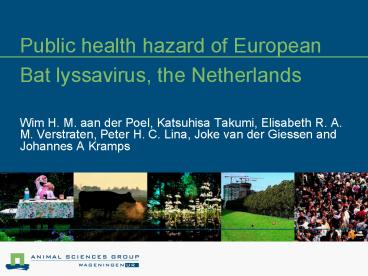Public health hazard of European Bat lyssavirus, the Netherlands - PowerPoint PPT Presentation
1 / 20
Title:
Public health hazard of European Bat lyssavirus, the Netherlands
Description:
... bat, Netherlands (1986 1993) Bat detector (green),, Actual sighting (black) ... Toon Pover CIDC. Peter HC Lina Naturalis ... – PowerPoint PPT presentation
Number of Views:101
Avg rating:3.0/5.0
Title: Public health hazard of European Bat lyssavirus, the Netherlands
1
Public health hazard of European Bat lyssavirus,
the Netherlands
- Wim H. M. aan der Poel, Katsuhisa Takumi,
Elisabeth R. A. M. Verstraten, Peter H. C. Lina,
Joke van der Giessen and Johannes A Kramps
2
Rhabdovirus familylyssavirus genusgenotypes
Envelope G-protein Matrix protein
- 1. Rabies
- 2. Lagos-bat
- 3. Mokola
- 4. Duvenhage
- 5. European Bat Lyssvirus type 1 (EBL1)
- 6. European Bat Lyssavirus type 2 (EBL2)
- 7. Australian Bat Lyssavirus (ABL)
Core N, NS, L proteins
3
Lyssavirus reservoirs and geographical
distribution
4
Incidents of confirmed fatal EBLV1 infections in
humans
- 1977 old girl bitten in finger
- Ukraine 15-year
- (Rabies Bulletin Europe 1987 412)
- 1985 11-year old girl bitten in lower lip
- Belgorod, Russia
- (Rupprecht et al., 1994)
5
Incidents of confirmed fatal EBLV2 infections in
humans
- 1985 30-year old male, bat-researcher
- Helsinki, Finland
- (Lumio et al., 1986)
- 2002 56-year old male bat worker
- Angus, Schotland
- (Fooks et al., 2002)
6
Eptesicus serotinus (Serotine bat)
7
Geographical distribution of Eptesicus
serotinus in Europe
8
Numbers of lyssavirus tested serotine bats in the
Netherlands (1984 - 2003)
9
Geographical Distribution of the Serotine bat,
Netherlands (1986 1993) Bat detector (green),,
Actual sighting (black)
10
Geographical Distribution of the Serotine bat,
Netherlands (1986 1993) Bat detector (green),,
Actual sighting (black)
11
EBLV in serotine bats per month2000-2005
12
EBLV1a in bats body parts(RT-PCR detection)
13
Incidents and contact types with serotine bats
2000-2005
14
Human bat contact incidents
? EBLV-neg ? EBLV-pos
People sometimes pick up rabid bats!
15
Cat- bat contact incidents
? EBLV-neg ? EBLV-pos
Cats seem avoid contact with rabid bats!
16
Risk of human rabies upon a bat bite
- f(i) likelyhood of number of virus particles
excreted (hardly any eperimental data) - r probability of infection after a bat bite
- High estimate p1-f(0) (all contacts give
infection) - Low estimate pr1-f(0)
- Based on mouse inoculation experiments and a
single hit model (maximum likelyhood) r1.610-3
17
Risk of human rabies after bat biteHigh estimate
- 2000-2005 17 bat bites reported
- 5/17 involved bats EBLV-positive (titers unknown)
- Exposure 2.8 bites per year per 16.3 miljon
people - Infectious dose unknown
- Likelyhood of no virus excretion f(0) 12/170.7
-gt likelyhood of virus excretion f(1) 1-f(0)0.3 - High estimate all 5 bats infectious gt 2.80.3
0.8 cases per year - Based on poisson distribution one could expect 1
case every 2 years (in case of no post-exposure
treatment!)
18
Risk of human rabies after bat biteLow estimate
- Likelyhood of virus excretion f(1) 1-f(0)0.3
- Probability of infection based on mouse
inoculation experiments and single hit model
(maximum likelyhood) r1.610-3 - Low estimate 0.31.610-3 510-4
- gt one case per 700 years
19
Conclusions
- EBLVs can cause fatal infections in humans
- EBLV is endemic in the serotine bat in the
Netherlands (20) - Bats can excrete EBLV in saliva but amounts are
unknown - Public health risk of EBLVs in bats cannot be
ignored but is hard to assess one case every 2
to 700 years - Active and passive surveillance of EBLVs in bats
is indicated for public health protection
20
Acknowledgements
Froukje Lodder-Verschoor RIVM Joke van der
Giessen RIVM Reina van der Heide RIVM Katsuhisa
Takumi RIVM Betty RAM Verstraten CIDC Hans
Kramps CIDC Toon Pover CIDC Peter HC
Lina Naturalis Wim HM van der Poel Animal
Sciences Group, Wageningen University
Research































